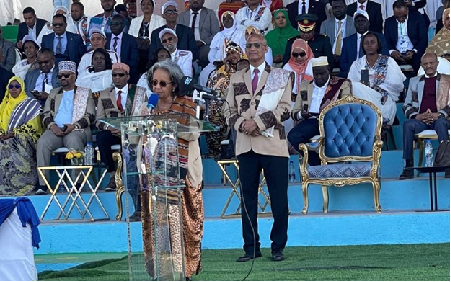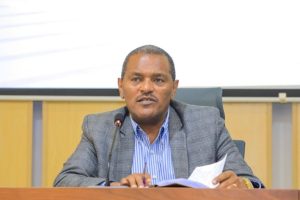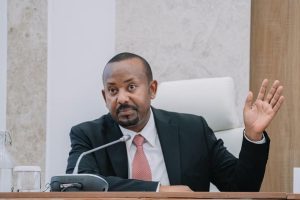
Several historians have acclaimed Ethiopia’s history as a testament to the coexistence and harmonious interaction among diverse societies, despite occasional rifts. They assert that Ethiopia’s ancient past, characterized by civilizations, empires, and unique historical events, holds significant value in shaping the nation as a harmonious home for all citizens while preserving their identities. In this regard, Nation, Nationalities, and People`s Day have special significance to all Ethiopians to further ensure their unity and an age-old culture of tolerance.
By recognizing and honoring the various ethnic groups and communities, this day promotes a sense of unity and shared identity among the people of Ethiopia. It also serves as a platform to acknowledge the contributions of different groups to the country’s history, development, and cultural richness, thereby fostering a spirit of inclusivity and national pride.
During the 18th Ethiopia Nations, Nationalities, and Peoples’ day celebration in Jigjiga city, Somali region, themed “Diversity and Equality for National Unity,” senior officials, dignitaries, and scholars shared insights on embracing diversity, fostering national identity, and addressing differences through a panel discussion and the presentation of study papers.
In his congratulatory message, Prime Minister Abiy Ahmed (PhD) expressed his firm belief that the celebration will help build a shared narrative of national unity. Being an Ethiopian means a national identity centered on multi-national unity. He also said, the concept of being an Ethiopian embraces the diversity of Nations, Nationalities and Peoples on one hand and recognize the strong synergy that had been binding Ethiopians for centuries.
Speaking on the occasion, President Sahle-Work Zewde emphasized the importance of building tolerance and prioritizing governing ideas over antagonistic ideologies. She highlighted the need to move away from the outdated “My way or no way” mindset, emphasizing that these efforts are crucial in laying a strong and unwavering foundation for unity.
President Sahle-Work underscored that the festival serves as a platform to demonstrate that the nation’s diversity, multinational unity, and equality are interconnected. She emphasized the significance of nurturing these values through shared narratives to foster national unity and fraternity. Additionally, the event serves as a reminder that diversity should not hinder unity and equality.
In addressing identity-related challenges, the President noted that developed countries have successfully navigated similar issues through inclusive dialogues among concerned entities. She stressed that living together as equals is the only viable option.
Furthermore, President Sahle-Work elaborated on the intrinsic connection between the greatness of Ethiopia and its people, emphasizing that the collective history, culture, and spirit of the nation are integral to its overall greatness. She emphasized the responsibility of safeguarding this greatness and highlighted the necessity of solving common problems through dialogue to ensure peace and development.
The President emphasized that diversity encompasses not only culture and language but also encompasses diverse thoughts. She strongly advocated for resolving differences through discussion and dialogue, rejecting armed conflict and the use of force to gain power. In her view, disagreements and differences of opinion should not lead to enmity.
Chief Administrator of Somali Regional State, Mustafe Mohamed, highlighted the historical challenges faced by certain regions, such as the Somali region, in terms of their participation in the political landscape. He emphasized the denial of the right to organize and run a regional party during the time of the Ethiopian People’s Revolutionary Democratic Front coalition (EPRDF) party. However, following the country’s recent reform efforts, the formation of a national party has provided equal opportunities for participation, including the right to organize as a regional entity.
Mustafe Mohamed emphasized the importance of unity among Ethiopians, stressing the need to strengthen brotherhood to effectively utilize the nation’s natural resources for the collective benefit.
Speaker of the Federal Democratic Republic of Ethiopia (FDRE) House of Federation, Agegnehu Teshager, emphasized that diversity is the cornerstone of Ethiopia, fostering mutual interaction and solidarity. He highlighted that diversity is an expression of identity-based on the principle of equality, representing an opportunity and wealth for the nation. Agegnehu asserted that diversity is not a burden but a reward for Ethiopians.
Furthermore, Agegnehu emphasized the need to strengthen the national unity system based on equality, preserving it through consultation and understanding in the face of challenges. He underscored that the celebration of this day contributes to cementing harmony and nationalism, while emphasizing the importance of resolving differences through dialogue to uphold national unity and combat egocentrism and extremism.
According to Agegnehu, all Ethiopians are responsible for upholding the rule of law, peace, and prosperity in the country. He emphasized the need for everyone to contribute to building a strong, united nation based on a shared narrative.
In a related development, Addis Ababa University recently hosted a panel discussion in conjunction with the celebration of NNPD. The panel’s objective was to rectify distorted narratives regarding the constitutionally guaranteed equality and common life, with a focus on fostering national unity, understanding, public truth, peace, and development.
Speaking at the event, vice President of Administration and Student Services at AAU Abdurazak Mohammed (PhD) emphasized the importance of recognizing diversity as a reality and promoting unity through constructive ideas.
Certainly, the unity of the people of Ethiopia is a foundational source of the nation’s strength. When individuals from diverse backgrounds come together in solidarity, it creates a powerful force that can overcome challenges, foster development, and build a cohesive society.
By embracing unity, Ethiopia can harness the collective strengths, talents, and contributions of its people to advance the nation’s progress in various fields, including social, economic, and cultural domains. This unity not only bolsters the country’s resilience but also forms the bedrock for a shared vision of a prosperous and harmonious future for all Ethiopians. Therefore, nurturing and preserving this unity is essential for sustaining Ethiopia’s enduring strength and resilience.
Overall, the Nations, Nationalities, and People’s Day play a crucial role in promoting unity, understanding, and solidarity across the diverse tapestry of Ethiopia. It provides an opportunity to celebrate the diverse cultures, languages, and traditions that exist within Ethiopia, while also emphasizing the commonalities that bind the nation together.
BY MENGISTEAB TESHOME
THE ETHIOPIAN HERALD TUESDAY 12 DECEMBER 2023




